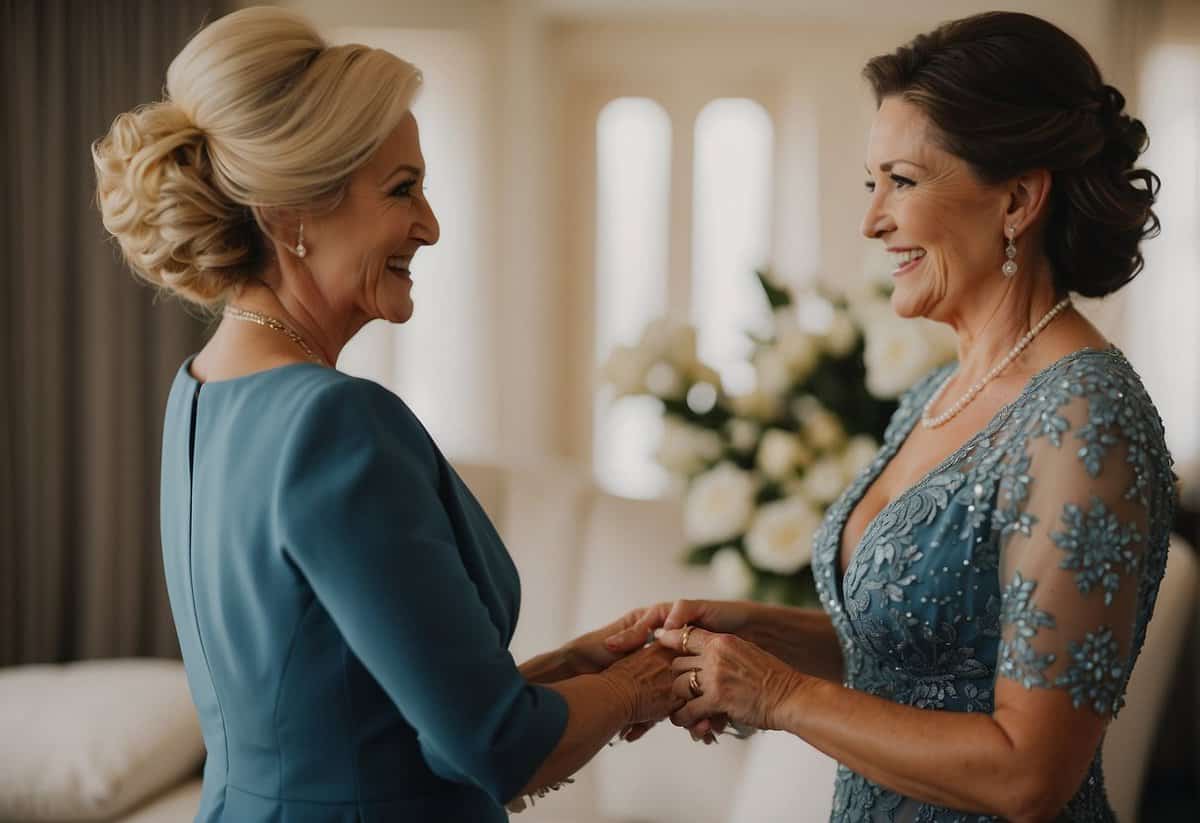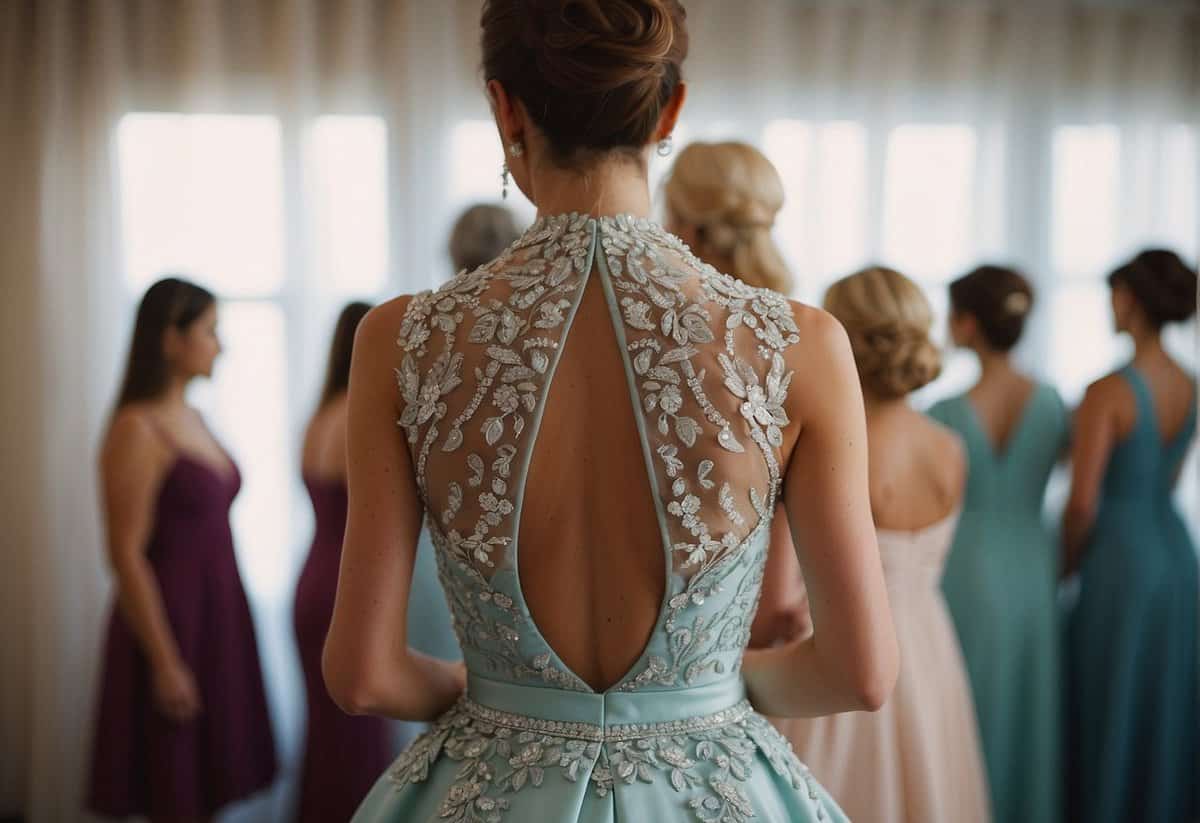Does the Mother of the Bride Pay for Her Own Dress? Understanding Wedding Attire Etiquette
When planning a wedding, many traditions and questions come into play, including the attire of the mother of the bride. You might be wondering if it falls upon you, as the mother of the bride, to pay for your own dress on this special occasion. Traditionally, the mother of the bride is responsible for purchasing her own wedding day outfit, which includes the dress and any accessories. This practice allows you to choose an attire that suits your style and budget, ensuring you feel comfortable and confident on your daughter’s big day.

As wedding customs evolve, the financial aspects of the celebration are more fluid, with expenses often being shared or divided differently among the families involved. However, regardless of changes in etiquette, the importance of communication and mutual decision-making within the family cannot be overstated. It’s crucial to have open discussions about budgets and expectations to avoid any misunderstandings. Remember that your role on the wedding day is not just about wearing a beautiful dress but also offering support and sharing in the joy of this momentous occasion.
Key Takeaways
- The mother of the bride traditionally pays for her own dress and accessories.
- Wedding customs can vary, and attire expenses might be shared among the family.
- Clear communication about wedding costs is essential for a harmonious event.
Understanding Traditional Roles

When it comes to traditional roles in weddings, you’ll find that these customs are not just about etiquette, but also about celebrating a milestone, offering emotional support, and honoring family traditions that have been passed down through generations. The role of the mother of the bride is steeped in tradition, symbolizing both unity and support on this important day.
Mother of the Bride Duties
Traditionally, your role as the mother of the bride is a blend of hostess and support system. You are there to offer emotional support and guidance while helping to uphold family traditions. A key element of your involvement might include selecting your own dress which is typically done after the bride has chosen her gown and in consultation with the groom’s family to coordinate styles.
Wedding Planning Involvement
Your involvement in the wedding planning is both significant and supportive. You may assist with the guest list, scout venues, or even take part in choosing the wedding attire. The essence of your involvement is to ensure that wedding preparations embody the joy and bond of the occasion, while respecting the couple’s wishes and creating a sense of unity within the bridal party and among families.
Support During the Ceremony and Reception
As the mother of the bride, you are an anchor of support. On the actual day, your presence is prominent from ensuring the bride feels confident to greeting guests and offering emotional support. It’s a day filled with generations coming together, and you help to reinforce that connection, embodying the richness of the traditional duties and mother of the bride etiquette that make the day truly special.
Navigating Wedding Attire

When it comes to picking out wedding attire, the mother of the bride plays a pivotal role—her dress reflects her personality and complements the wedding’s theme. Let’s focus on ensuring that you select the perfect mother-of-the-bride dress that harmonizes with the bridal party and is accessorized aptly to celebrate the special day.
Choosing the Right Dress
Your dress should be a reflection of your style while respecting the formality of the event. It is customary for the mother of the bride to consult with the bride about her dress choice, to ensure it aligns with the overall wedding aesthetic. Remember, while shopping for your dress, prioritize comfort alongside elegance. For a summer wedding, a lighter fabric may be appropriate, whereas a formal evening wedding may call for something more refined, like a tailored gown.
Coordinating with the Bridal Party
It is important for your dress to complement the wedding’s color palette. This doesn’t mean matching the bridal party exactly, but rather choosing a hue that blends well. To avoid clashing, discuss color options with the bride. She might have a specific shade in mind or prefer that you coordinate with the general tone of the bridal party’s attire. For instance, if the bridesmaids are wearing pastel, a deep jewel tone or neutral could be a sophisticated choice for you.
Accessorizing the Outfit
The right accoutrements will polish off your outfit. Think understated jewelry—perhaps a pearl necklace or elegant diamond studs. Your shoes should be chosen for both style and comfort, considering you’ll be on your feet most of the day. A clutch or small handbag is also essential for your personal items. As for a veil, it’s not a typical choice for mothers, but a stylish hat or fascinator might be suitable, especially for a formal daytime wedding.
The Financial Aspect of the Wedding

When planning a wedding, understanding who is financially responsible for various expenses, such as the dress of the mother of the bride, can help in managing your budget effectively. Let’s explore the specific costs often associated with weddings.
Who Covers the Dress Costs?
Traditionally, the mother of the bride pays for her own dress. This custom aligns with the general expectations that bridal party members cover their own attire costs. However, wedding etiquette has evolved, and sometimes couples may choose to help with these expenses, especially if they have specific attire requirements for their wedding party.
Managing Wedding Expenses
As you plan the wedding, it’s vital to create a budget that includes key expenses such as the venue, vendors, and attire for the wedding party. To reduce financial strain, discuss with the bride’s parents their willingness and ability to contribute. Financial support can vary widely from one family to another.
- Wedding Planning Process: Stay organized with a list of expenses and regularly review them with all contributors.
- RSVPs: Closely manage your guest list, as the number of attendees can significantly affect the cost of the wedding venue and catering.
Contribution to Pre-Wedding Events
The mother of the bride often plays a role in pre-wedding events, which may include the rehearsal dinner and bridal showers. In these events, her contribution can be both organizational and financial. It’s common for different family members to assist in these costs, and the extent of this support should be discussed early in the wedding planning process.
Remember, each family’s approach to wedding expenses may differ, and clear communication about costs and responsibilities is essential to ensure a stress-free lead-up to the big day.
Emotional and Social Considerations

As the mother of the bride, your role intertwines with emotional and social nuances that extend beyond financial contributions, such as paying for your dress. Not only are you a pillar of support, but you are also an integral part of pre-wedding events and the wedding ceremony itself. Your participation helps create special memories and contributes to the joy of the wedding planning journey.
Offering Emotional Support
During the wedding planning process, your emotional support is invaluable. It’s your loving presence that helps weather the inevitable stresses that come with planning such a significant event. When faced with decisions like venue selection or setting the seating chart, offering a listening ear or a comforting hug can make all the difference. Remember, it’s the emotional moments, perhaps when choosing the perfect makeup and hair styles, where your support will not only be appreciated but cherished.
Engagement in Pre-Wedding Events
Your engagement in pre-wedding events, from the bridal shower to the rehearsal dinner, requires a balance of participation and leadership. As you welcome guests and field questions, it’s essential to do so with a warm smile, ensuring everyone feels included. At times, you may be called upon to share a wedding speech; here, infusing love and support with cherished anecdotes will add a personalized touch. By taking part in events and tasks leading up to the wedding ceremony, your involvement helps to set the tone for a beautiful celebration.
Frequently Asked Questions

When planning for a wedding, understanding financial expectations is essential. This FAQ section addresses common inquiries regarding the mother of the bride’s financial responsibilities.
What expenses should the mother of the bride typically cover?
The mother of the bride traditionally helps with some of the wedding costs, such as her attire, travel expenses, and sometimes a portion of the wedding reception or other festivities. More detailed responsibilities are outlined in this guide from The Knot.
Is the bride’s mother responsible for her own dress costs?
Yes, the bride’s mother is usually expected to pay for her own dress. It’s important to select a dress that fits within her budget while complementing the wedding’s theme and palette.
How are wedding dress expenses generally divided among family members?
While the mother of the bride is responsible for her dress, the bride’s dress and bridal party attire are typically expenses that the bride and her family may cover. The division of wedding expenses varies greatly among families and should be discussed openly.
What are the traditional costs for the bride’s family in a wedding?
Traditionally, the bride’s family pays for the wedding ceremony and reception costs, including venue, food, and entertainment. Flowers, photographer/videographer, and the bride’s attire are often included as well. Each family’s situation differs, and traditions are often adapted.
Can the bride’s mother expect financial assistance for her dress?
Financial assistance for the mother of the bride’s dress is not commonly expected. However, if budget is a concern, conversations about dress expenses can be had with the family to understand if there’s room for support or to set a reasonable budget.
What financial responsibilities does the bride’s mother have in wedding planning?
Besides her own attire, the bride’s mother may contribute to costs of the reception, wedding planner, or stationery. Her role also extends beyond financial to supporting the couple in their planning process.

